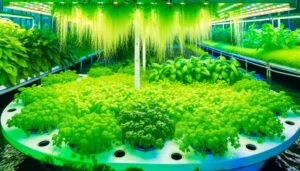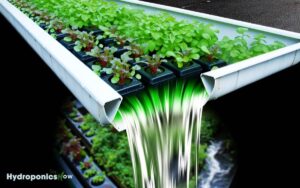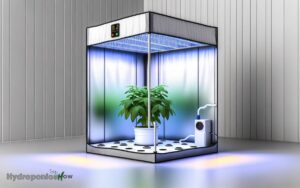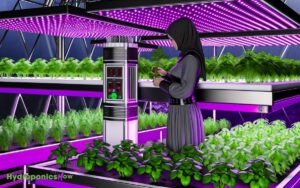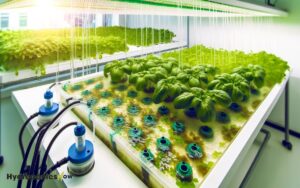What Is Hydroponic Plant Food: A Complete Guide!
Hydroponic plant food is a specialized water-soluble nutrient solution formulated to deliver essential macronutrients and micronutrients directly to plants in soil-less cultivation systems. This precise nutrient management optimizes plant health, growth rates, and productivity by ensuring balanced and efficient absorption.
Key components include macronutrients such as nitrogen, phosphorus, and potassium, alongside critical micronutrients like iron and manganese. Both synthetic and organic nutrient solutions are available, designed to meet the specific requirements of various hydroponic systems.
Through careful formulation and regular monitoring, hydroponic plant food plays a crucial role in achieving high yields and maintaining plant health. Further insights await exploration.
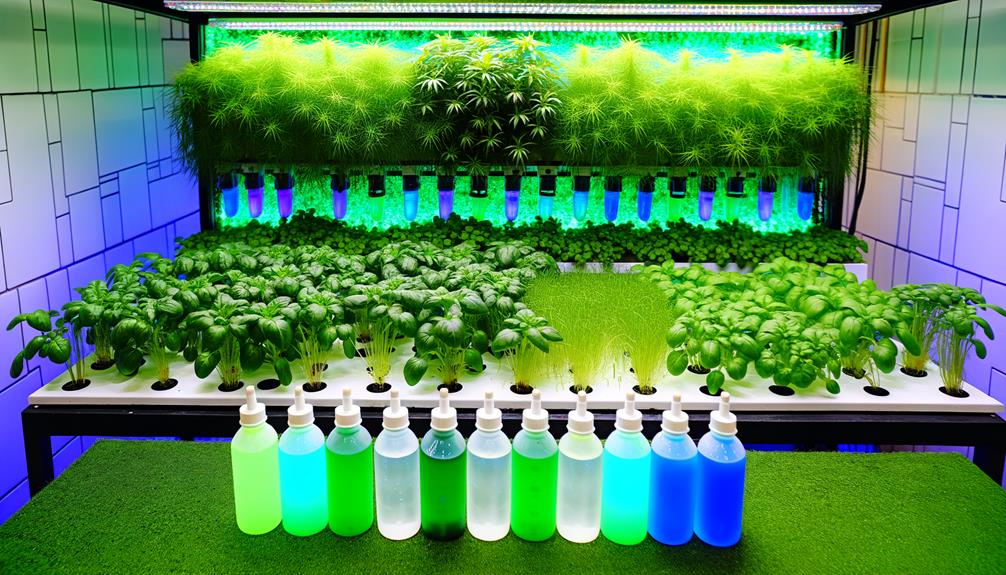
Key Takeaways
- Hydroponic plant food is a water-based nutrient solution directly supplying essential nutrients to plants.
- It includes balanced macronutrients (N, P, K) and micronutrients (Fe, Mn, Zn) for optimal growth.
- Nutrient solutions can be organic, synthetic, or custom mixtures tailored to specific plant needs.
- Properly formulated hydroponic nutrients enhance plant health, productivity, and growth rates.
Understanding Hydroponic Nutrients
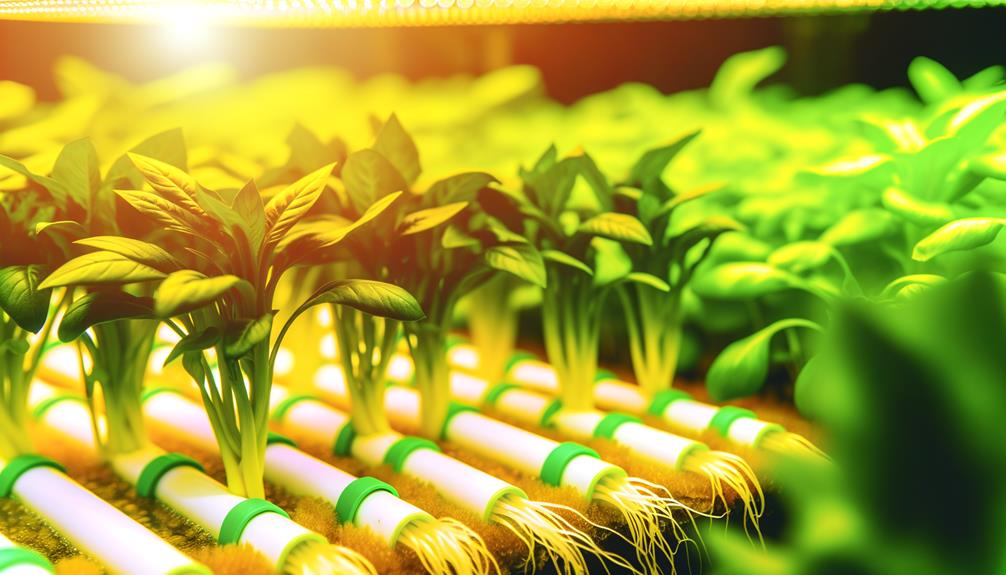
Understanding hydroponic nutrients requires a thorough examination of the specific mineral and chemical requirements essential for ideal plant growth in a soilless system.
In hydroponics, the absence of soil necessitates that all necessary nutrients be supplied directly via a water-based solution. This system allows for precise control over nutrient concentrations, which is critical for enhancing plant health and productivity.
Scientific studies have demonstrated that nutrient imbalances can lead to deficiencies or toxicities, greatly impacting growth rates and yields. Consequently, an evidence-based approach to formulating nutrient solutions is crucial.
This involves understanding the plant’s nutrient uptake mechanisms, the solubility of different compounds, and the interactions between various elements within the solution.
Accurate nutrient management is foundational for achieving optimal results in hydroponic cultivation.
Essential Nutrient Components
A thorough nutrient solution in hydroponics must contain a balanced mix of macronutrients and micronutrients to meet the specific needs of the plants.
Macronutrients such as nitrogen (N), phosphorus (P), and potassium (K) are required in larger quantities and are vital for fundamental processes like photosynthesis, energy transfer, and cell division. Essential secondary macronutrients include calcium (Ca), magnesium (Mg), and sulfur (S), which support structural integrity and enzyme function.
Micronutrients, though needed in smaller amounts, are equally important and include iron (Fe), manganese (Mn), zinc (Zn), copper (Cu), molybdenum (Mo), boron (B), and chlorine (Cl).
These elements collectively guarantee peak growth, development, and productivity in hydroponically grown plants, highlighting the necessity for precise nutrient management.
Types of Hydroponic Plant Food
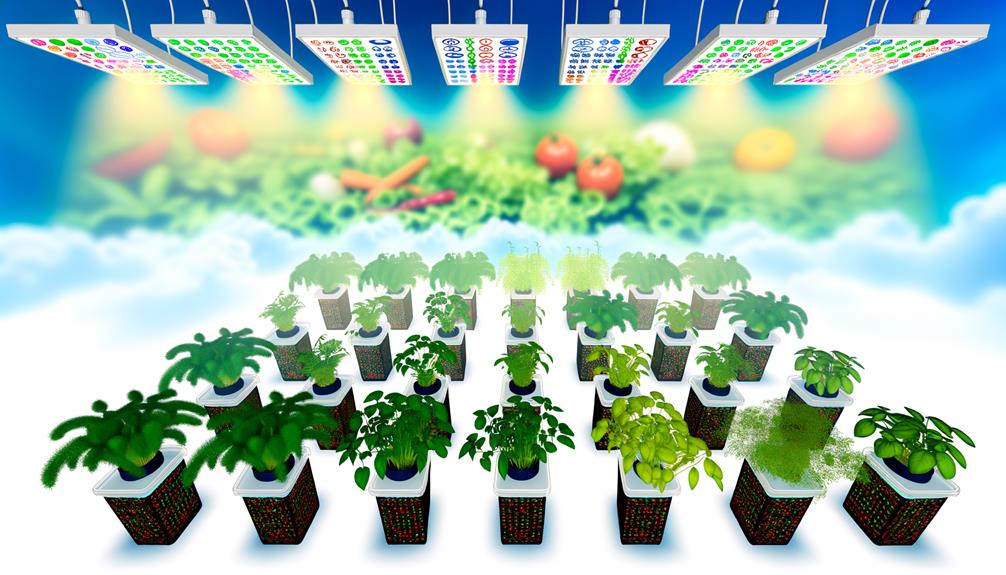
The types of hydroponic plant food can be categorized into three primary groups:
organic nutrient solutions, synthetic nutrient blends, and custom nutrient mixtures.
Organic nutrient solutions are derived from natural sources and emphasize ecological sustainability.
Conversely, synthetic nutrient blends offer precise nutrient compositions.
Custom nutrient mixtures are tailored to specific plant needs, allowing for optimized growth conditions.
Organic Nutrient Solutions
Organic nutrient solutions, derived from natural sources such as compost teas, fish emulsions, and seaweed extracts, offer an eco-friendly alternative to synthetic hydroponic plant food. These solutions provide essential macro and micronutrients, supporting robust plant growth and enhancing soil health. Studies have demonstrated that organic options can match the efficacy of synthetic counterparts, promoting sustainable agriculture without compromising yield.
| Source | Key Nutrients Provided |
|---|---|
| Compost Teas | Nitrogen, Phosphorus, Potassium |
| Fish Emulsions | Nitrogen, Calcium, Magnesium |
| Seaweed Extracts | Potassium, Iron, Zinc |
Adopting organic nutrient solutions aligns with environmental stewardship goals and reduces chemical dependencies. By leveraging these natural alternatives, cultivators can achieve high productivity while fostering ecological balance and enhancing the resilience of their hydroponic systems.
Synthetic Nutrient Blends
Synthetic nutrient blends, meticulously formulated to deliver precise ratios of essential macro and micronutrients, play a crucial role in maximizing hydroponic plant growth and productivity. These blends are designed to supply plants with a balanced and consistent nutrient profile, ensuring ideal absorption and utilization.
Key components of synthetic nutrient blends include:
- Macronutrients: Nitrogen (N), Phosphorus (P), and Potassium (K) are foundational elements required in large quantities for growth, flowering, and fruiting.
- Micronutrients: Elements such as Iron (Fe), Manganese (Mn), and Zinc (Zn) are necessary in trace amounts for various physiological functions, including enzyme activation and chlorophyll production.
- Chelates: These compounds enhance nutrient availability by preventing precipitation, thereby ensuring that nutrients remain soluble and accessible to plant roots.
Custom Nutrient Mixtures
Custom nutrient mixtures, formulated to meet specific plant requirements and growth stages, offer hydroponic cultivators the flexibility to tailor nutrient profiles for ideal plant health and yield.
By adjusting the concentrations of essential macronutrients (nitrogen, phosphorus, potassium) and micronutrients (iron, manganese, zinc), growers can optimize conditions for vegetative growth, flowering, and fruiting phases.
Evidence supports that precision in nutrient management can enhance photosynthetic efficiency, root development, and resistance to environmental stressors.
Customizable formulations allow the inclusion of beneficial additives, such as amino acids and vitamins, further enhancing plant resilience and productivity.
Consequently, growers using custom nutrient mixtures can achieve higher yields and superior quality produce, meeting the specific demands of various hydroponic crop types.
Benefits of Hydroponic Solutions
Hydroponic solutions offer a controlled and nutrient-rich environment that can substantially enhance plant growth and yield. This method of cultivation provides several scientifically validated benefits:
- Optimal Nutrient Delivery: Plants receive essential nutrients directly to their roots, facilitating efficient absorption and minimizing nutrient deficiencies.
- Water Conservation: Hydroponics uses up to 90% less water than traditional soil-based gardening, making it a sustainable choice for regions with water scarcity.
- Accelerated Growth Rates: Studies indicate that hydroponically grown plants can mature up to 25% faster than their soil-grown counterparts, due to the precise control of environmental conditions and nutrient availability.
These advantages underscore the efficacy of hydroponic solutions in modern agricultural practices, promoting both sustainability and productivity.
Choosing the Right Nutrient Mix
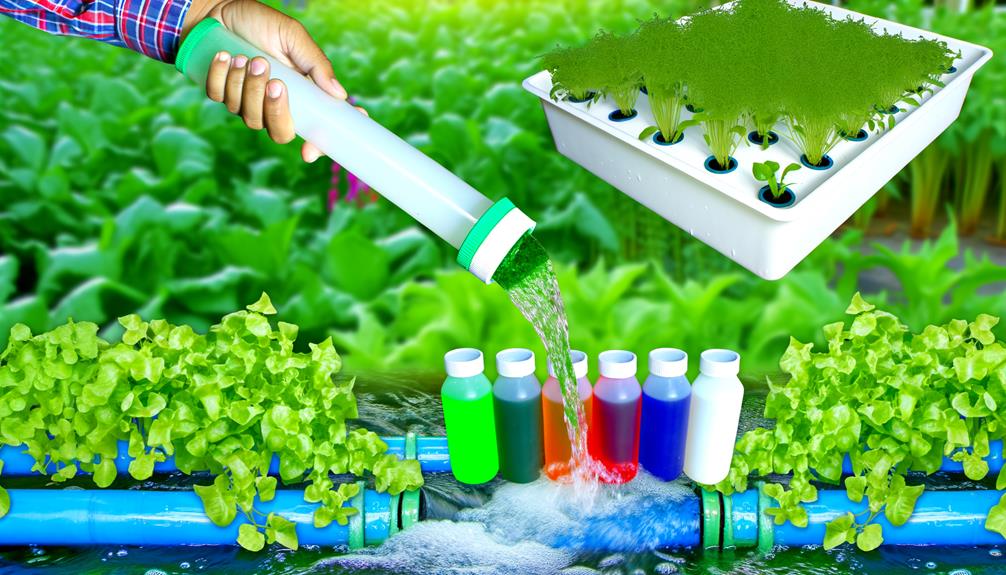
Selecting an appropriate nutrient mix is crucial to achieving ideal growth and health in hydroponically cultivated plants. The nutrient solution must supply essential macroelements such as nitrogen (N), phosphorus (P), and potassium (K), alongside critical microelements like iron (Fe), manganese (Mn), and zinc (Zn).
The concentration and ratio of these nutrients should be meticulously balanced, based on the specific requirements of the plant species and its growth stage. Empirical evidence suggests that precision in nutrient formulation greatly impacts photosynthesis, respiration, and overall biomass production.
Commercial nutrient solutions often provide tailored mixes designed to enhance plant performance. Nonetheless, regular monitoring and adjustment are necessary to maintain optimal nutrient levels, ensuring robust and healthy plant development in hydroponic systems.
Application and Maintenance Tips
Regular application and meticulous maintenance of the nutrient solution are imperative to enhancing plant health and yield in hydroponic systems. To achieve this, precise management practices must be adhered to, guaranteeing the stability and efficacy of the nutrient environment. This involves monitoring pH levels, electrical conductivity, and nutrient concentrations to prevent deficiencies or toxicities. Safely using hydroponic nutrients ensures that plants receive optimal nourishment without the risk of contamination or imbalance. Additionally, periodic flushing of the system helps eliminate salt buildup, promoting sustained growth and productivity.
Key strategies include:
- Consistent Monitoring: Regularly test the pH and electrical conductivity (EC) levels of the nutrient solution to maintain ideal ranges, typically between 5.5-6.5 for pH and 1.2-2.0 mS/cm for EC.
- Scheduled Nutrient Replacement: Replace the nutrient solution every 1-2 weeks to avoid nutrient imbalances and the buildup of toxic elements.
- Cleanliness: Routinely clean the hydroponic system components to prevent algae growth and pathogen proliferation, which can compromise plant health.
These practices guarantee a conducive growth environment for hydroponic plants.
Conclusion
In summary, hydroponic plant food is integral to the success of soil-less cultivation systems, providing essential nutrients required for peak plant growth.
An interesting statistic reveals that hydroponic systems use up to 90% less water than traditional soil-based agriculture, highlighting their efficiency and sustainability.
The selection of the appropriate nutrient mix, combined with proper application and maintenance, guarantees robust and healthy plant development, demonstrating the significant advantages of hydroponic solutions in modern agriculture.

